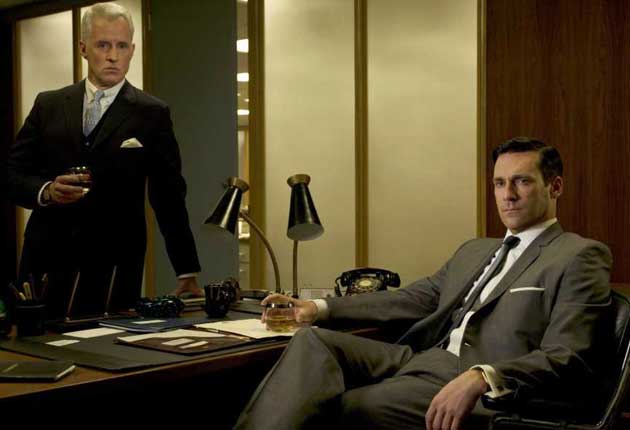Mad Men: A true guilty pleasure
Its lack of political correctness is what makes it great, says Gerard Gilbert

Your support helps us to tell the story
From reproductive rights to climate change to Big Tech, The Independent is on the ground when the story is developing. Whether it's investigating the financials of Elon Musk's pro-Trump PAC or producing our latest documentary, 'The A Word', which shines a light on the American women fighting for reproductive rights, we know how important it is to parse out the facts from the messaging.
At such a critical moment in US history, we need reporters on the ground. Your donation allows us to keep sending journalists to speak to both sides of the story.
The Independent is trusted by Americans across the entire political spectrum. And unlike many other quality news outlets, we choose not to lock Americans out of our reporting and analysis with paywalls. We believe quality journalism should be available to everyone, paid for by those who can afford it.
Your support makes all the difference.Yes, it does live up to the hype. Mad Men, which returns for a second series on BBC4 tonight is smart, subtle, quietly engrossing and totally original television, and the chattering classes are right to be chattering about it. The first series was set in the fag-end of the Eisenhower era, at the Madison Avenue offices of fictional advertising firm Sterling Cooper, one of whose accounts is supposedly Richard Nixon's unsuccessful presidential campaign of 1960. The new series picks up the story in 1962 – in the midpoint of the Kennedy era.
Fashionistas love the sharp suits and bombshell dresses, design fans lap up the retro-modern interiors, and just about everybody is tickled by the ad-men's heroic smoking and three-martini lunches. These guys could blow their weekly alcohol units before midday on a Monday. However historically accurate (and I sometimes wonder whether smoking isn't overstated in modern costume dramas), the fagging and boozing does amuse us, a nostalgic refuge from our own nanny-state health legislators. You can imagine the look of uncomprehending disdain that would pass across the ruggedly handsome face of Don Draper (Jon Hamm) and his colleagues if they were to be confronted by today's tobacco-puffing pariahs, forced to shiver outside offices and pubs. And what of 21st-century advertising power lunches conducted over nothing stronger than a mineral water? They'd be as bemused as a Kalahari bushman in downtown Tokyo.
But the Manhattan advertising folk also have a lot of rather more unsavoury habits – their ingrained sexism, racism, anti-Semitism, homophobia – and Mad Men is a bit of an historical theme park for unreconstructed attitudes. Like Life on Mars, it's kind of fun, a safe arena for exploring pre-PC behaviour .
Mind you, this must be a harder watch for women. A female friend described the feeling she gets from Mad Men as a mixture of nostalgia and revulsion. It helps (or not) that the characters are so well nuanced by creator and chief writer Matthew Weiner, and come with their own contradictions. Don Draper, for example, may be casually chauvinistic – as well as cheating on his gorgeous wife Betty (played by Grace Kelly-esque January Jones) – but he does recognise and promote the talents of his former secretary, and the show's proto career-woman, Peggy Olson.
It can be argued that Life on Mars was reactionary, and the words of American critics suggest something similar might be going on with Mad Men. Here is Entertainment Weekly enthusing about an era when "play is part of work, sexual banter isn't yet harassment, and America is free of self-doubt, guilt, and countercultural confusion". Or how about the Los Angeles Times reckoning that the show had found "a strange and lovely space between nostalgia and political correctness".
Mmm... should we feel guilty about this pleasure? I suppose one way of gauging Mad Men would be to ask whether Jeremy Clarkson would like it. My guess is that it would be too slow and understated for his tastes. In series two, the old certainties of Madison Avenue start coming under pressure from social and cultural forces, and there's a terrific scene in tonight's opener when Draper goes for a lunchtime drink (no change there then) and comes across a fellow imbiber reading poet Frank O'Hara's "Meditations in an Emergency". A new beat sensibility is in the air – one of the Sterling Cooper copywriters has also grown a beard and started smoking a pipe. The times they are a-changing, and Draper is threatening to go all existential on us. I, for one, can't wait.
'Mad Men' starts on BBC4 tonight at 10pm
Join our commenting forum
Join thought-provoking conversations, follow other Independent readers and see their replies
Comments